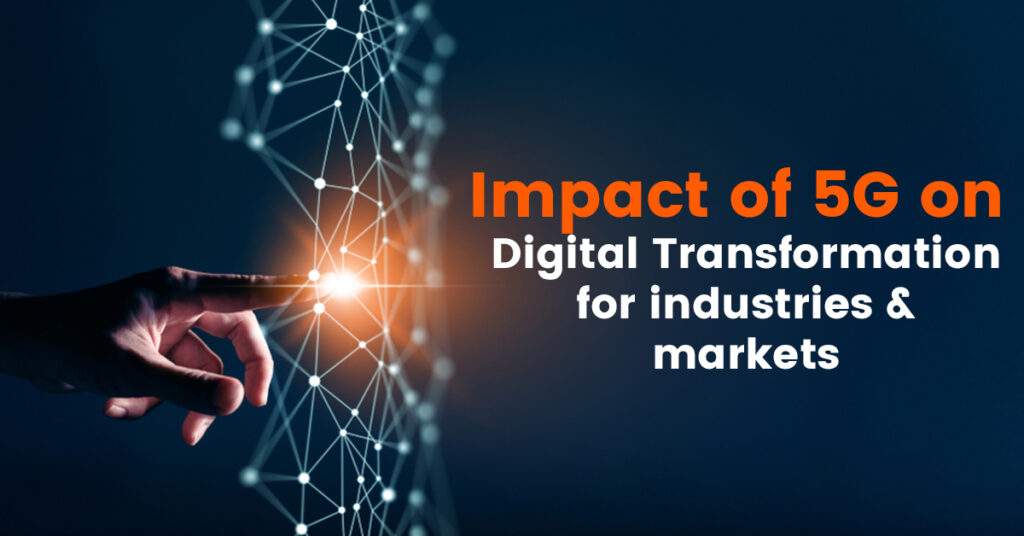5G is a 5th- generation technology for mobile broadband networks, the deployment of which began in some countries in 2019 as a planned replacement for the existing 4G network. 5G technology is very similar to 4G or 3G, where the service area is divided into small geographic areas called cells, and all 5G wireless devices in a particular cell are connected to the Internet via radio waves through a local antenna in the cell. Here are the impact of 5G on digital transformation for industries & markets.
The use of 5G is expanding
The Global Association of Mobile Carriers has identified 224 telecom operators in 88 countries that have either demonstrated 5G capabilities, are currently testing 5G networks, or have already deployed 5G networks in their specific areas (2019), and these numbers are expanding rapidly.
As of 2022, more than 700 million telecommunications and Internet users will be using 5G networks. Some estimates put the number at nearly 1 billion! The adaptability and uptake of 5G has been the fastest compared to other networks.
Recently, the Indian government has officially launched 5G services in several cities as leading telecom firms have promised to cover the entire India with 5G by the end of 2023.
The biggest advantages of the 5G network
- The three biggest advantages of 5G over 4G and older networks are speed, bandwidth, and low latency.5G has been proven to deliver up to 20 gigabits per second (Gbit/s), changing everything we know about data transmission and data usage.
- With higher bandwidth and lower latency, 5G can connect to multiple devices simultaneously, representing a major shift towards the Internet of Things (IoT) and machine learning ecosystem as more and more applications are developed on the 5G platform.
- Overall, the 5G network allows more and more users to connect with each other, consume more content at high speed, and connect millions of devices simultaneously, transferring tons of data instantly. And this opens up a new world of possibilities for digitally transforming industries and sectors.
The impact of 5G on digital transformation for industries and sectors
- Technically, 5G brings 10x faster speed with 50x lower latency, representing unprecedented creation, adaptability, and use of IoT applications, with highly advanced Machine-to-Machine connectivity and the deployment of artificial intelligence in various industries. and sectors.
- This impact of 5G will transform and revolutionize digital transformation as we know it. And no industry or sector will be left untouched by this massive transformation.
How 5G is impacting various industries and unleashing a massive digital transformation:
1)Security cameras
With 5G, surveillance cameras are getting smarter, more connected, and sharper. Supported by high-speed, low-latency 5G, Surveillance Cameras can now recognize faces in an optimized way, match them with millions of other images, detect connections, and predict their actions through highly advanced AI algorithms.
2)Content consumption, especially videos, and games
- Probably the biggest shift we’re seeing with 5G is in content consumption behavior.
- With ultra-high-speed 5G in every home, content consumption in homes, offices, public places, and entertainment centers will skyrocket, offering a variety of options to choose from.
- Video consumption will skyrocket as the Internet gradually replaces television as the medium for content.
3)Health services
- Supported by 5G high-definition video consultations, assistive robots, and smart wearables, the healthcare sector is witnessing an unprecedented digital transformation.
- 5G makes doctors independent of location as they are able to perform more surgeries and consultations through highly advanced video conferencing and virtual simulators, saving more lives and making a positive impact on society.
4)Robotics and automation with the edge cloud
- With 5G, cloud computing is evolving into a powerful Edge Cloud, and this is changing everything, especially in the robotics and automation industry.
- With Edge Cloud, the processing and control of robots can happen outside of their structure, which means more control, flexibility, and capabilities. They can be easily programmed and then reprogrammed to serve different needs and requirements.
- Thanks to the 5G network and the Edge Cloud, robots can be used to automate many activities in agriculture, manufacturing, healthcare, defense, retail, and more. More importantly, the same bots can be used and reused multiple times.
5)LAN exchange
- According to some studies, 5G will gradually replace decades-old LAN technology to provide high-speed connectivity for on-premises organizations, and this is a game-changing moment. This will happen because the speed of 5G is almost the same as the speed of LAN, in fact, the frequency of 5G will be higher than LAN.
- Once LAN is removed and replaced by 5G, the client-server architecture will witness a paradigm shift in usage and applications, especially cloud computing. Organizations will no longer need to purchase and maintain expensive servers as 5G technology will use the cloud for data transfers and storage.
- The light of day will see new, exciting, and useful cloud-based applications that can revolutionize the entire IT sector.
Conclusion
The impact of 5G on the economy will be significant and will give further impetus to the fourth industrial revolution with the acceleration of the Internet of Things. Its fast and reliable real-time data transmission will greatly benefit sensors and controllers installed in equipment, machinery, and logistics chains across industries.
Whether in agriculture, manufacturing, consumer electronics, telecommunications, healthcare, automotive, enterprise communications, industrial automation, and more, 5G is becoming the catalyst to unleash unprecedented digital transformation and enable more users to experience the future.

